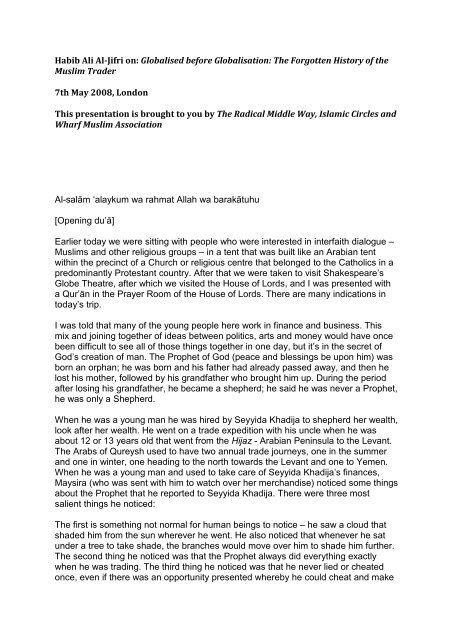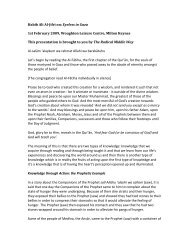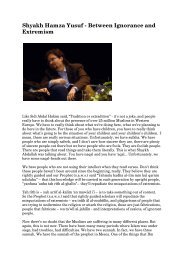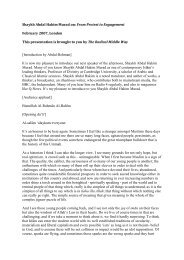PDF Transcription Habib Ali Al-Jifri - Radical Middle Way
PDF Transcription Habib Ali Al-Jifri - Radical Middle Way
PDF Transcription Habib Ali Al-Jifri - Radical Middle Way
You also want an ePaper? Increase the reach of your titles
YUMPU automatically turns print PDFs into web optimized ePapers that Google loves.
<strong>Habib</strong> <strong><strong>Al</strong>i</strong> <strong>Al</strong>-<strong>Jifri</strong> on: Globalised before Globalisation: The Forgotten History of the<br />
Muslim Trader<br />
7th May 2008, London<br />
This presentation is brought to you by The <strong>Radical</strong> <strong>Middle</strong> <strong>Way</strong>, Islamic Circles and<br />
Wharf Muslim Association<br />
<strong>Al</strong>-salām ‘alaykum wa rahmat <strong>Al</strong>lah wa barakātuhu<br />
[Opening du’ā]<br />
Earlier today we were sitting with people who were interested in interfaith dialogue –<br />
Muslims and other religious groups – in a tent that was built like an Arabian tent<br />
within the precinct of a Church or religious centre that belonged to the Catholics in a<br />
predominantly Protestant country. After that we were taken to visit Shakespeare’s<br />
Globe Theatre, after which we visited the House of Lords, and I was presented with<br />
a Qur’ān in the Prayer Room of the House of Lords. There are many indications in<br />
today’s trip.<br />
I was told that many of the young people here work in finance and business. This<br />
mix and joining together of ideas between politics, arts and money would have once<br />
been difficult to see all of those things together in one day, but it’s in the secret of<br />
God’s creation of man. The Prophet of God (peace and blessings be upon him) was<br />
born an orphan; he was born and his father had already passed away, and then he<br />
lost his mother, followed by his grandfather who brought him up. During the period<br />
after losing his grandfather, he became a shepherd; he said he was never a Prophet,<br />
he was only a Shepherd.<br />
When he was a young man he was hired by Seyyida Khadija to shepherd her wealth,<br />
look after her wealth. He went on a trade expedition with his uncle when he was<br />
about 12 or 13 years old that went from the Hijaz - Arabian Peninsula to the Levant.<br />
The Arabs of Qureysh used to have two annual trade journeys, one in the summer<br />
and one in winter, one heading to the north towards the Levant and one to Yemen.<br />
When he was a young man and used to take care of Seyyida Khadija’s finances,<br />
Maysira (who was sent with him to watch over her merchandise) noticed some things<br />
about the Prophet that he reported to Seyyida Khadija. There were three most<br />
salient things he noticed:<br />
The first is something not normal for human beings to notice – he saw a cloud that<br />
shaded him from the sun wherever he went. He also noticed that whenever he sat<br />
under a tree to take shade, the branches would move over him to shade him further.<br />
The second thing he noticed was that the Prophet always did everything exactly<br />
when he was trading. The third thing he noticed was that he never lied or cheated<br />
once, even if there was an opportunity presented whereby he could cheat and make
more money. These are the three foundational things that were spread at the hands<br />
of Muslim traders.<br />
In a Prophetic tradition it is said that God loves those of you who, when doing<br />
something, they do it well. So He tied doing something well, with His love for you and<br />
I. There is a vast difference between someone who does something well in order to<br />
gain a reputation in the market place to sell his products, and someone else who<br />
does his work well to attain divine love. If one does his work well just for his<br />
reputation in the market place, he will have his standards set by what is in that<br />
market place; but the one that does well for the sake of <strong>Al</strong>lah, then his standard will<br />
necessitate doing everything in his power to do his work well because <strong>Al</strong>lah is the<br />
one looking at him and <strong>Al</strong>lah knows the secrets within.<br />
There was a Muslim craftsman who lived in the Levant and someone had<br />
commissioned him to do a piece for him, and when the man came to pay the<br />
craftsman, he really liked the work he had done. But the craftsman noticed<br />
something he himself didn’t like – something in the detail that the man hadn’t even<br />
looked at. He said to the man, ‘Give me one more day and I’ll do it even better,’ but<br />
the man said, ‘I’m happy as it, it’s even better than I expected.’ But the craftsman<br />
replied saying, ‘No, either you take your money and go, or you leave it with me a day<br />
and I’ll make it better.’ So the man left it with him and the next day he returned and it<br />
was better than before. The man asked the craftsman ‘Why did you insist on keeping<br />
it for another day, if I was happy with it as it was?’ He said ‘Because it was <strong>Al</strong>lah who<br />
gave me that skill with which I did that work well, so I fear that if I do not do this work<br />
to the utmost of the skill that <strong>Al</strong>lah has given me, <strong>Al</strong>lah will strip me of this skill. Or at<br />
the very least I would be someone not giving the gratitude I should have.’<br />
The other thing Seyyida Khadīja’s servant said about the Prophet, apart from that he<br />
did everything well and precisely, he would never cheat even if it would have made<br />
him more money. That directly correlates and relates to the spirit of the Muslim<br />
trader. As you know – and many of you know better than I do – that sometimes you<br />
are faced with a choice of ‘do I keep my principles and make a little less in financial<br />
terms, or do I sell my principles to make money?’<br />
To hold onto principles and ethics while doing work well, are coupled together, and<br />
they become one crucible, or melting pot, out of the intention of doing it for <strong>Al</strong>lah;<br />
they put an inherent strength within the trader, which makes him someone who<br />
possesses wealth and is not possessed by his own wealth. He then ascends to a<br />
rank that even the animals and plants and elements, have an experience of<br />
interacting with this person. We believe that everything in existence remembers God;<br />
there is nothing in existence that does not glorify His praise. When the trader is<br />
trading, but dealing with God in the way of worship, whereby his state is a state of<br />
glorification, then his state of glorification will reverberate with the entire state of the<br />
cosmos and there’ll be harmony between the two states of glorification. But if it’s just<br />
our tongues that glorify and not our states of being, then just as we do not<br />
understand that inanimate objects glorify God, inanimate objects do not understand<br />
how we glorify God either.<br />
I don’t want to prolong the theory, but this abstraction I’m talking about became real<br />
– it became something practical in our history. People who deal with money love the
language of numbers. Two thirds of Muslims enter Islām without the sword. They<br />
entered Islam through men whose hearts were attached to divine presence. Most of<br />
the people who possessed those hearts, were traders such as yourselves – that’s<br />
the South East of Asia, Indonesia, Singapore, South of India, the whole of East<br />
Africa, the centre of Africa, the West of Africa – the people in all of these places<br />
entered Islām at the hands of men who were traders. Most of the people in Egypt<br />
didn’t become Muslim until 800 years after Islām entered Egypt. But Indonesia<br />
became majority Muslim after 400 years. What’s the population of Indonesia?<br />
Approximately 270 million, and according to some statistics the Muslims make up<br />
86% of the Muslim population. Some people think it’s even more. The population<br />
was 3-5 million a few hundred years ago. If we were to go back to the 3-5 million<br />
populations, when Islām entered, how many people do you think they would have<br />
needed to propagate Islām and interact with the non-Muslims to spread Islām?<br />
I heard a few moments ago during the introduction that there’s 100,000 people<br />
working in Canary Wharf, and approximately 11,000 Muslims, is that right? So about<br />
11% of the Canary Wharf Community are Muslim? Do you think it was about 11% of<br />
Muslims that entered Indonesia and brought Islām with them and convinced the<br />
people? What is 11% of 3 million? Let’s let you answer, because we don’t know<br />
numbers as well as you do [Audience laugh].<br />
[An audience member says ‘330,000’]<br />
So do you think we would have needed 330,000 in Indonesia or more, to spread<br />
Islām? Come on Canary Wharf, tell us...[Audience laugh]. Really, how many people<br />
do you think? Give me something that’s reasonable. 100,000? For spreading Islām<br />
to 3 million people? Someone is saying 1000. I ask this question because the reality<br />
of history teaches us that 9 people entered Indonesia and spread Islām. These nine<br />
are known by name, and even their graves. Eight out of those nine were traders.<br />
How many people do you think convinced Bangladesh of Islām? What is the<br />
population of Bangladesh? The man who brought Islam to Bangladesh was Mawlāna<br />
Jalāl <strong>Al</strong>-dīn, with another man in another area.<br />
East Africa – Islām came to that region with traders who brought the message of<br />
Islām and the same with West Africa. They were all working in trade. I don’t know<br />
what power they had to convince people to come to this light because of them. It is<br />
directly related to the theory we spoke about in the beginning; they had principles,<br />
they had everything, they did well, they were people who remembered God and had<br />
good character when they dealt with people. The remembrance of God was in their<br />
hearts, but it was apparent on their faces in their dealings with people. There were<br />
people who remembered God with sincerity and honesty, and this appeared in the<br />
principles they kept and upheld in their characters, whilst doing their work well.<br />
In today’s time of globalisation, with its good and its bad, I think the role of Muslim<br />
trader or Muslim merchant can have good character, holding onto his principles, and<br />
his perfection of his work, and can be a guide to people through the globalisation we<br />
are living through right now. They can be a leader amidst this globalisation. But it<br />
requires certain things in the makeup of the Muslim trader. Some of the educators of<br />
souls used to say that the important thing isn’t whether you have money or you don’t
have money, whether you renounce wealth or you don’t renounce wealth; the<br />
important thing is where the money is to be found. Is it in your mind or in your heart?<br />
Because a man is a servant to whatever is in his heart. So whatever possesses your<br />
heart is your god. So if money starts filling your heart, then you become a slave to<br />
money.<br />
The Prophet (saw) said ‘Wretched is the slave of the dinar, wretched is the slave of<br />
the dirham.’ He is wretched and falls back on himself, and if he was pierced by a<br />
thorn he wouldn’t have anything to pull the thorn out with. This is the end road for<br />
someone who is a slave to money. Whatever kind of happiness he lives will be<br />
turned to wretchedness and now matter how little he sins, he will have to fall. When<br />
he is confronted by problems, and problems confront everyone in their lives, it is very<br />
difficult for him to come out of his problem unscathed. But the one who has this world<br />
in his hand, knows how to deal with it, he knows how to direct it, he possesses it and<br />
it doesn’t possess him.<br />
Someone was talking to us about the marketing strategy after the time of the nephew<br />
of Freud, who wanted to create a need for a commodity rather than people needing a<br />
commodity that exists. The theory was based on creating an elite for a commodity<br />
that people didn’t even have before. I think this was the start of the problems we see<br />
in globalisation today, because it made the merchant change from being the servant<br />
of God on Earth - who wants to cultivate the Earth - to someone who corrupts the<br />
Earth and exploits the Earth.<br />
This is where your role come in. You’re in Europe, in Britain, in London, in a<br />
community of merchants and traders and business men – to be more exact – you’re<br />
in the centre of commerce. There are conflicts within the world of commerce. How<br />
can you form through your connection to each other, on the basis of good moral<br />
character, on the basis of holding onto your principles, on the basis of you doing your<br />
work well, and on the principle of you doing your bit for the wider community – you<br />
are a community that can actually show another model of commerce at this time.<br />
Just to finish off, I would like to ask you to do three things.<br />
The first: your connection to the people around you: what’s your intention behind<br />
those connections? Is it just to make money? Or pleasure? Or to pass the time? If<br />
that’s it, then what’s the difference between you and a non-Muslim? Ask yourself<br />
that. Think about your connection to the people around you. Is it based on you<br />
wanting good for them and mercy for them? Even if you differ with them, even if you<br />
end up differing with each other to the point that you start arguing – review your<br />
relations with people. It will make present in your mind when you’re actually dealing<br />
with people, how the Prophet (saw) would have dealt with it in the same situation.<br />
The second: your relations between each other. There are bases upon which<br />
people formulate relationships – be it religion, ethnicity, or coming from the same<br />
country, it could be nationalism, or just worldly interests, or because they like<br />
something about each other. But you’re a Muslim, so your foundation with the<br />
relationship with the Muslims is, as God says, ‘And help each other in goodness and<br />
consciousness of <strong>Al</strong>lah (taqwā)’
The third point: test yourself everyday when you’re on your own, sit and think in the<br />
presence of God, of how you were that day in the market place. There are two<br />
markers for you to know your state with God: the first is the presence of your heart<br />
when you go to pray; ask yourself is your state when you go to pray before God,<br />
better this night or worse than before? Because it’s an indicator of what your state<br />
was during that day.<br />
The second is the state of your heart with the people around you. Do you increase in<br />
love or hatred or anger?<br />
These two things are the basis for you actually putting the message out to the world,<br />
about the global message of Islām, during this age of globalisation. Once you have<br />
reviewed yourself on that night, it will impact on your behaviour at work the next day.<br />
Would you lie to people if you’ve reviewed yourself truthfully? Would you cheat?<br />
Would you take the opportunity to make some quick money at the expense of<br />
someone else? These indications will show themselves to you during your work.<br />
You have a huge responsibility. You need to study the life and biography of the<br />
Prophet (saw) and there are books about the traders that came before you, so you<br />
should read their biographies; how they opened hearts and countries.<br />
[Closing du’ā]












